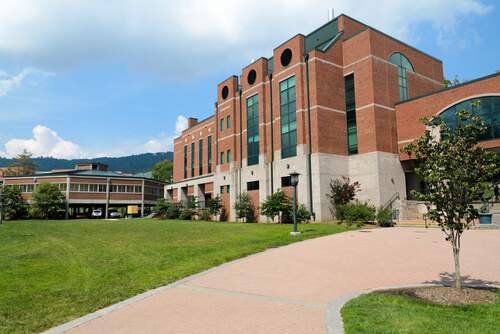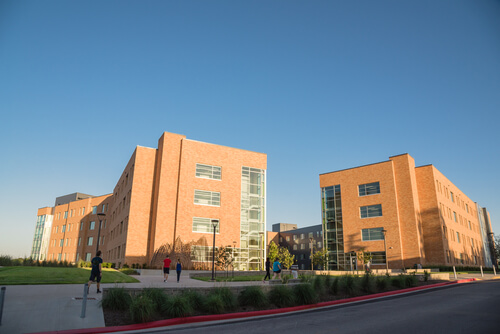If you’re almost done with high school or have been working for a few years, it could be time to start thinking about what’s next in your educational journey. As you search to find the best option, you might wonder about the difference between college and university. The differences might seem subtle, but understanding them will be vital in making the right choice for you.
Featured Programs
The Historical Evolution of the Words ‘University’ and ‘College’
Originating between 1250 CE and 1300 CE, the word ‘university’ is derived from the Latin phrase ‘Universitas magistrorum et scholarium’ (“community of teachers and scholars”). The word ‘college,’ derived from the Latin ‘collegium,’ was coined a little later in the mid-14th century.
History of Higher Education in the US

Funded by the religious organizations themselves, many of the early Colonial colleges in the US began as training for ministers. The schools were modeled after several English and Scottish universities and offered a broad liberal arts curriculum. Various denominations would open colleges, train clergymen, and send them in the community to become leaders and ministers. While some students studying law or medicine earned degrees from schools overseas, many in the US received their training through apprenticeships. It wasn’t until the mid-1700s that schools for law and medicine became more accessible. By the mid-1800s, graduate-level degrees became more popular, and schools like Harvard, Wisconsin, Columbia, and Michigan became leaders in this area. After the American Revolution, schools began to broaden their mission and include more subjects. The Morrill Land-Grant Acts of 1862 and 1890 enabled states to start public colleges and universities, which specialized in engineering and agriculture. The number of schools boomed in the 20th century, as did the number of students on campus. As the need for specific training for blue-collar workers increased in the 1920s, junior colleges were formed to address vocational needs at a lower cost. These colleges are now more commonly referred to as community colleges and continue to provide the same educational blueprint. Higher education continued to evolve from this point until today’s modern university system emerged. Aspiring students can now choose from over 5,000 schools in the US, including everything from online colleges to community colleges to esteemed ivy league universities.
The General Term ‘College’
As you begin looking at the difference between college and university, you might notice the word ‘college’ used in various ways:
- as a general term for attending a higher learning institution after high school (i.e., going to college, college students, or college athletes)
- a term for a vocational school (like a community college or junior college)
- as the name of a sub-school within a larger university (like the College of Arts and Sciences from The University of South Carolina), which is essentially like a department that houses similar degree options within a larger university
- as the degree-granting institution that you plan to attend (like Amherst College)
In America, the word “college” is typically used as an umbrella term for students who have graduated high school (or have an equivalent) and are planning to earn a subsequent degree at a higher learning institution. For example, you might hear students say they are ‘looking at colleges’ or are ‘finding ways to pay for college.’ You might even hear that they are excited to attend ‘college’ when they are, in fact attending a university. However, using the two words interchangeably can cause some confusion because colleges and universities have some distinct differences to consider.
The Difference Between College and University
What is a College?

Even though it has several meanings in casual talk, a college is an institution of higher education that typically only awards undergraduate degrees. Generally speaking, a college will be smaller than a university and home to only a few thousand students or less. Also, there won’t be as many degree options to choose from.
Before you start thinking that colleges have too many downfalls, some clear advantages can make choosing a college the right choice for you. Colleges might have fewer students than universities, but that means that your classes will be smaller. This might also mean you could have a closer relationship with the faculty and more one-on-one attention. The campus itself won’t be as big, which could make the experience less intimidating for you.
Types of Colleges:
- Vocational/technical school: a school focused on career-oriented training, culminating in a certificate or specialization rather than a degree.
- Community/junior college: a 2-year school that mirrors freshman and sophomores’ education at a 4-year institution. The main goals are either an Associate’s degree or completion of general education requirements for transfer to a 4-year college. To explore some of the differences between community colleges and four-year institutions, check out our article 2-Year Versus 4-Year Colleges.
- 4-year college: primary focus is curriculum leading to a Bachelor’s degree
What is a University?

A university, on the other hand, is an institution of higher learning that offers both undergraduate and graduate programs. Think of a university like a grouping of various schools, that includes a college (where you earn your Bachelor’s degree) and then graduate-level schools where you can earn a Master’s degree or even a PhD. Universities might even have a law school or a medical school, enabling you to also pursue a professional degree instead.
Take Harvard University, for example. Harvard University comprises 12 degree-granting institutions, including several graduate schools, a medical school, a law school, Divinity School, Harvard College, and more. If you are an undergraduate, you will be a Harvard College student and complete your Bachelor’s degree. You can then apply to a graduate or professional program within the larger institution, Harvard University. All graduate and professional schools operate separately, with different admissions offices and research faculty, but are all a part of the same larger university system.
A few more general characteristics of universities could include:
- a much larger student population (some over 30,000 students!)
- a wider range of academic disciplines, including more degree options
- possibly more extracurricular options for students like sports teams, student programs, student services, etc.
Because universities offer more undergraduate degree options, there will be multiple schools within the larger university system. For example, the University of Colorado has undergraduate options like the School of Engineering and Applied Sciences, the College of Music, the School of Education, or the Leeds School of Business. Once you complete your general education requirements (typically taken during the first two years), you will declare your major and be accepted into one of these departments. Here, you might have program-specific tutoring, guidance, and support.
If taken on a full-time basis, undergraduate students can typically earn their Bachelor’s degree in just 4 years. The undergraduate degrees will seamlessly lead to the Master’s and Doctorate level programs, some of which you can take in an accelerated form. For example, some universities have 4 + 1 programs that allow you to earn your Bachelor’s and your Master’s degree in just 5 years. It is important to remember that the graduate and professional schools will have separate requirements for admission. Just because you attended the undergraduate school doesn’t mean you are automatically admitted into one of their graduate school programs. Typically, you’ll need to take a standardized test, like the GRE, and complete all the application requirements to gain admission.
Why, then, Do Some ‘Colleges’ Offer Graduate Degrees?

This is where the definition of ‘college’ and ‘university’ can get a little tricky. Just like the rules of English grammar defy themselves sometimes, so does this topic. You might be wondering: if colleges don’t typically have graduate schools, what about reputable ones like Dartmouth College that have extensive graduate programs?
It’s important to remember that there are always exceptions to the rule, and the definition won’t always be completely exclusive. So, you’ll always want to approach this topic on a case-by-case (or school-by-school) basis. Some schools started as a college, and over time, have added in graduate degrees. But because of tradition, name recognition, or alumni preference, the school decides not to change its name to a university.
Analyzing a Few Misconceptions About the Difference Between College and University:
- Misconception #1: Colleges are private and universities are public. Many people believe that colleges are private and universities are public (or state-funded), but that is not necessarily the case. Whether a college or university is public or private doesn’t have to do with its name, but rather with how the school is funded. Public schools are mostly funded by the state government, while private schools are funded by private contributions and higher tuition costs.
- Misconception #2: One option is better than the other. There is no academic difference between a college and a university. Likewise, your degree will be respected from either institution, so that should not play a factor in deciding which is best.
The Term Around the Globe:
This piece of information won’t be life-changing, but it might be important to note while you are researching. Using the word “college” to represent your post-grad education options is primarily an American view. In fact, other countries like Canada, Australia, and England use the word “university” as the catchall term instead.
Additional Difference Between College and University:
When analyzing the difference between college and university, we must also look at some more specific distinctions like the difference between community college and university, the difference between community college and college, the difference between institute and university, and the difference between liberal arts college and university.
What is the difference between community college and university?

The difference between community college and university comes down to the type of degree offered. First of all, a community college is typically a 2-year school resulting in an Associate’s degree, specific training programs, or completion of general education requirements, while a university offers undergraduate, graduate, and professional degree options. Another difference between community college and university is community college vs university cost– community colleges cost much less than universities do. Because of the variation in price, many students will choose to earn their general ed requirements at their local community college, and then transfer to a university to complete their degree. Community colleges often offer easier admission requirements. If you don’t think your numbers will cut it, consider starting out at a community college and transfer later. Similarities between community college and university include having a high school diploma or equivalent for admission, student services, and flexibility.
What is the difference between community college and college?
Even though these terms are similar, each purpose is very different. The difference between community college and college also comes down to the type of degree offered. A community college does not award 4-year Bachelor’s degree like colleges do. Instead, their purpose is to help students complete their general education requirements, get specific training, or obtain an Associate’s degree. Many students will begin their collegiate experience at a community college and transfer to a 4-year college to finish their degrees.
What is the difference between institute and university?
An institute is an institution of higher learning that focuses its studies on one main academic area, rather than offering an array of degree options (i.e., a technology institute like Georgia Tech that is a technology-focused college). Thus the difference between an institute and university boils down to a targeted degree in a specific academic area vs. the ability to choose a degree from a long list of options.
What is the difference between liberal arts college and university?
The difference between liberal arts college and university can be summed up as the following:
Liberal Arts College: well-rounded education, smaller campus, smaller class sizes, more centered on classroom discussion
University: lecture-based classes, larger campuses, larger student body, research opportunities
Should I Choose a College or a University?
The decision on whether to choose a college or a university will be completely up to you. There is no academic difference between college and university, so the school’s fit to your preferences and career goals should take precedence in your decision.
Let’s review a little bit!
- advantages of a college: smaller campus, smaller class sizes, possibly more student/faculty interaction
- advantages of a university: more degree offerings, graduate programs, larger atmosphere, might include more student programs, more sports programs
When you’re trying to decide on whether a college or a university is the right fit for you, here are a few factors to consider:
Does the college/university have:
- academic major options that fit your goals
- academic rigor
- proper institutional accreditation
- student support services
- internship/real-world opportunities
Whichever school checks the most boxes for you will be your wisest choice. Now that you know the difference between college and university, you can make an informed decision on what is best for you and your path forward!